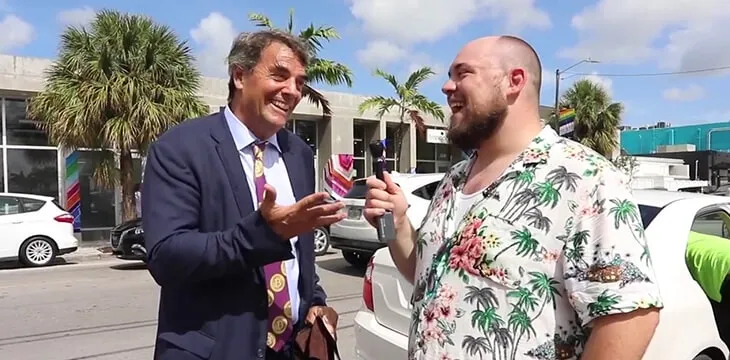|
Getting your Trinity Audio player ready...
|
BTC investor Tim Draper doesn’t trust anyone who claims to be Satoshi Nakamoto, likely because the person most publicly associated with that claim would say Draper is backing the wrong horse … again.
Last month, CoinGeek’s Chief Bitcoin Historian Kurt Wuckert Jr. attended the BTC laser-eyed fantasy camp in Miami. The clear highlight of this trip was the free tacos and pizza slices he redeemed from local restaurants through the combination of the Omniscape app, NFT technology and the BSV blockchain.
CoinGeek’s Chief Bitcoin Historian @kurtwuckertjr takes us to Miami, where people gather to talk about the so-called “giant Frankenstein monster”—aka BTC.
Watch the future of AR/VR advertising: https://t.co/cKXF4pK3co pic.twitter.com/bqusbGoP2q
— CoinGeek (@RealCoinGeek) June 30, 2021
However, Wuckert also grabbed an impromptu man-on-the-street interview with none other than Tim Draper, third-generation venture capitalist and noted HODLer, who purchased his first cache of BTC via the U.S. government’s auction of the tokens seized from illegal drug marketplace Silk Road.
Wuckert began by asking what inspired Draper to get into BTC, leading Draper to claim that he was always interested in digital currencies and drew inspiration from their use as transferrable virtual goods in online video games. That led Draper to BTC, which he said offered a “universal opportunity that could be global, open and transparent.”
Wuckert suggested that Draper was referencing tokenization and asked if Draper knew that Bitcoin had an innate ability for tokenization until the BTC Core camp neutered this functionality in order to ensure success of their proprietary Layer 2 solutions, such as the Lightning Network. Draper expressed ignorance of this slice of history, then began an unintentionally ironic speech about Bitcoin becoming a “great store of value,” thereby confirming the very functional gelding Wuckert was referencing.
Draper used Argentina’s notoriously unstable economy to underscore the “trust in the system” that BTC can offer, but Wuckert noted that Argentina’s “penny-sized economy” means the average Argentinian can’t afford to pay the fees to open or close a channel on the main BTC blockchain that would allow them to access Lightning.
Draper then claimed that the Lightning-friendly Open Node processor (in which Draper was an early investor) alleviates this problem, leading Wuckert to ask if that ‘solution’ doesn’t reintroduce the need for trust in a third party that Draper claimed was inherent in BTC.
Somewhat nonsensically, Draper argued that this return to relying on a trusted third-party actually builds trust in the system. Honestly, it resembled that Spinal Tap scene where director Marty Dibergi keeps asking why the band simply doesn’t make their amps louder, to which a befuddled Nigel can only think to repeat ‘but these go to 11.’
Wuckert closed by asking if Draper saw any value in big-block protocols such as BCH and BSV. Draper said BCH is “kind of interesting,” due to it being “very easy to move around.” But when Wuckert pointed out that BCH is only capable of around 200 transactions per second (TPS) while BSV can handle 50k TPS on chain, Draper chuckled nervously and began looking for the exit, mumbling “yeah, but I don’t trust anyone who says they’re Satoshi.”
Draper’s acknowledgement of BSV’s superior technology, coupled with his apparent disdain for Bitcoin white paper author Dr. Craig Wright, is a vivid illustration of how even third-generation VCs can let emotions cloud their judgment. But this wouldn’t be the first time that pride led to a Draper fall, even if Draper refuses to admit it.
Draper was an early investor in Theranos, the former Silicon Valley darling that claimed to have made dramatic advances in blood testing technology. These claims were ultimately exposed as pure fiction, resulting in the company’s collapse and federal fraud charges against former CEO Elizabeth Holmes. Yet long after the fraud was exposed, Draper claimed Holmes had been “bullied into submission” and he would still “back her as chief science officer” of a new firm.
It’s possible that Draper’s ongoing defense of Holmes as “a great icon” may mask inner pain at having been so thoroughly (and publicly) duped by an apparent con artist. If so, it could explain his unwillingness to take a risk and acknowledge Wright’s role in the creation of the Bitcoin technology Draper professes to hold in such high esteem.
Then again, Draper’s original investment in Theranos was a mere $500,000, while his original $19 million BTC buy is now worth considerably more than it was in 2014. If Wright is Satoshi, and BSV is the true manifestation of the white paper’s vision, then Draper’s stacks of BTC will be worth about as much as one of Holmes’ boondoggle blood boxes.
It will be interesting to hear Draper’s post-mortem praises of Greg Maxwell and Adam Back after Blockstream and Lightning Labs collapse under their own weight (and/or be ‘bullied into submission’). Draper may trust the system, but his misplaced trust in the individuals currently controlling that system may ultimately prove his undoing.

 09-10-2025
09-10-2025 





